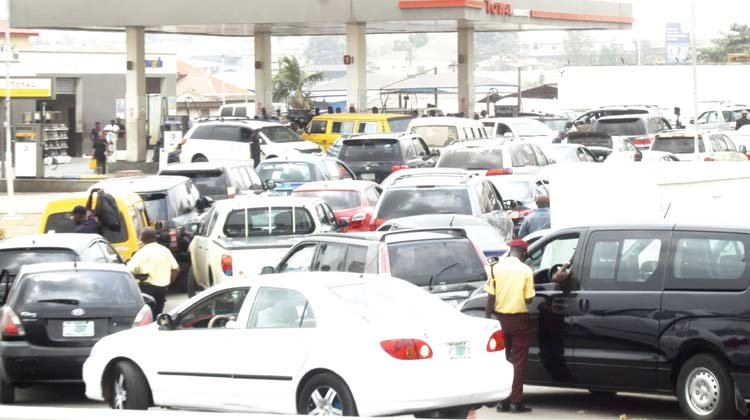
Oil marketers who purchased the ethanol-blended Premium Motor Spirit, popularly called petrol, are decanting the sludge in the contaminated PMS and selling the remnants, it was learnt on Monday.
Sludge is a semi-solid slurry that can be produced from a range of industrial processes, such as water treatment, waste-water treatment or on-site sanitation systems, among others.
It was also gathered that petrol was still being sold around N200/litre by some marketers, as against the approved N162-N165/litre price, because they purchased the commodity above N170/litre ex-depot cost, higher than the regulated rate of N148/litre.
Our correspondent gathered that ethanol in the bad fuel, which was imported into Nigeria in January, formed a sludge in the product, while many marketers purchased the commodity unknowingly.
The National Secretary, Independent Petroleum Marketers Association of Nigeria, Chief John Kekeocha, explained that the contamination varied, as some filling stations had purchased products with a high degree of sludge, while others bought PMS with less adulteration.
“The adulteration in the contaminated product is not that liquid, it is a sludge and so you cannot melt it easily,” he stated.
He added, “If you fill a can with fuel that has this sludge or adulterated content, the sludge will settle at the bottom of the can. So there is nothing to use and melt it, apart from decanting it and throwing it away.
“To give you an instance, some marketers who were lucky to have loaded some volumes of these adulterated products and found out in time, what they did was to decant the sludge and take the remaining ones to go and sell.
“That was what many of them did. However, some of them lost about 10, 20 or more drums. But some who were unlucky completely loaded the sludge and there was nothing they could do than to throw all of it away.”
Kekeocha stated that marketers who bought products with high levels of sludge would be compensated, adding that IPMAN had been identifying filling stations in this category.
He said, “The degrees of contamination were variable. Some marketers encountered about 1,000 litres of contamination, others recorded more than that. Those ones we count as being lucky.”
“But there are some who loaded full sludge and couldn’t sell at all. Such people are the ones who have many problems and should be taken care of. For those who have minimal quantities of the sludge, they went ahead to decant it and sell the remnants.”
On the cost implication of this on marketers, Kekeocha said, “It has a lot of cost effects on marketers and we are making arrangements to ensure that most of them who had such colossal losses, the government has to intervene to sort them out.”
When asked to explain why some members of IPMAN were selling petrol above the regulated N165/litre price, the association’s secretary stated that it was because they purchased the commodity above the regulated ex-depot price.
He said, “The fact is that during that period of scarcity when we encountered contaminated products, a good number of marketers got those products from tank farms at higher prices, from N171 – N175/litre. The regulated price is around N148.
“And as a result of this, they had to sell a little above what they bought, but as products are circulating now and depots start to sell at the regulated price, definitely the pump price will return to normal.”
Kekeocha added, “So the problem was that marketers bought the product at a higher price and it will not be wise for them to sell below their cost price and make losses, except if it becomes very necessary for them to recover their money.
“However, it will be unfortunate if those in charge of the regulation of prices insist that marketers must sell at the regulated price. This is because marketers will not buy at the approved ex-depot price and decide to sell higher than what was approved as pump price.”
When contacted and asked if there had been any change in the ex-depot and pump prices of petrol, the spokesperson of the Nigerian Midstream and Downstream Regulatory Authority, Kimchi Apollo, replied in the negative.
“The authority has not approved a change in price, whether ex-depot or pump price and it is illegal to sell above the regulated prices,” he stated.
Apollo told our correspondent that the authority would continue to ensure that marketers abide by the approved prices, as the government was working hard to ensure the adequate provision of petroleum products nationwide.
Copyright PUNCH.
All rights reserved. This material, and other digital content on this website, may not be reproduced, published, broadcast, rewritten or redistributed in whole or in part without prior express written permission from PUNCH.
Contact: [email protected]





